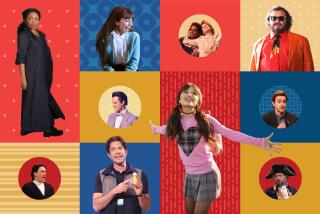‘SNL’ Doesn’t Have to Be Hip to Be Funny
- Share via
Howard Rosenberg’s trashing of “Saturday Night Live’s” season premiere struck me as a sadly predictable, knee-jerk reaction (“The New ‘Saturday Night Live’ Looks Ready for ER,” Calendar, Oct. 2). Rosenberg excoriates the show for its insufficient hipness and its lack of “nastiness” and “bile.” What he doesn’t seem to understand, is that comedy, like all art forms, evolves. The hip, counterculture jibes from the “SNL” of the ‘70s would be stale today. What is cutting-edge and dangerous to one generation becomes formulaic and dull to the next.
In the opening version of the new “SNL,” the sketch in which Will Ferrell helped Mariel Hemingway get off the phone by loudly threatening to kill her wasn’t biting or “hip”--it was just funny. (Incidentally, the show is better watched in a group than alone with pen in hand and scowl on lips.) I’ve always loved Charlie Chaplin, but I never found him hip. Even the concept of “hipness” has a bell-bottoms ring to it.
It is the very “hipness” of “SNL’s” classic episodes that has dated them so badly, whereas Second City TV’s shows are timeless for their plain, old silliness. Most of the sketches on the “SNL” season premiere were simply smart, unforced silliness and that’s a good start. It sure beats where they were.
Last year “SNL” felt defeated. The performers looked embarrassed (and based on their exodus and subsequent comments clearly were). This cast appears confident and enthusiastic, and that new spirit will, I think, carry the show back to prominence.
Rosenberg mentioned the studio audience’s “tepid” reaction, but friends of mine who were at the show in New York told me that the response from the live audience was absolutely frenzied. (Rosenberg’s misreading of their reaction undoubtedly owes more to the way the show was miked than to any actual lack of appreciation on the part of the audience. If NBC had actually allowed us to hear how rabidly the crowd had reacted, doubtless they would have been accused of sweetening the response.)
Will “SNL” again be the critical and popular success it was in its glory days? That’s the question that Rosenberg seems to be asking. But that’s an unfair standard. “SNL” in the ‘70s was a revelation, but the rest of the industry jumped on the bandwagon of their irreverent, cheeky style. Half of what made the early “SNL” episodes so funny was how shocking they were.
When you see the reruns it can be quite eye-opening how unfunny and heavy-handed even some of the most celebrated pieces now seem. Many of the current cast were too young to even stay up to watch “SNL” in its heyday. For them “SNL” has always just “been there”--some casts funny, others less so, but none of them the guerrilla satirists older fans still seem to yearn for.
In the past 15 years, casts have changed more or less gradually with cast members leaving or being sloughed off as others were hired. But NBC wisely decided to largely scrap that system--the last cast was huge and awkward and had zero chemistry. Nobody has rank in this cast, which is why the current show has an exciting, ensemble feeling. If allowed to, they should develop their own style and their own feelings.
As the public gets to know these performers, I’m confident that people will begin to appreciate their gifts, but institutions aren’t rebuilt in a day . . . or an episode.
More to Read
The complete guide to home viewing
Get Screen Gab for everything about the TV shows and streaming movies everyone’s talking about.
You may occasionally receive promotional content from the Los Angeles Times.






